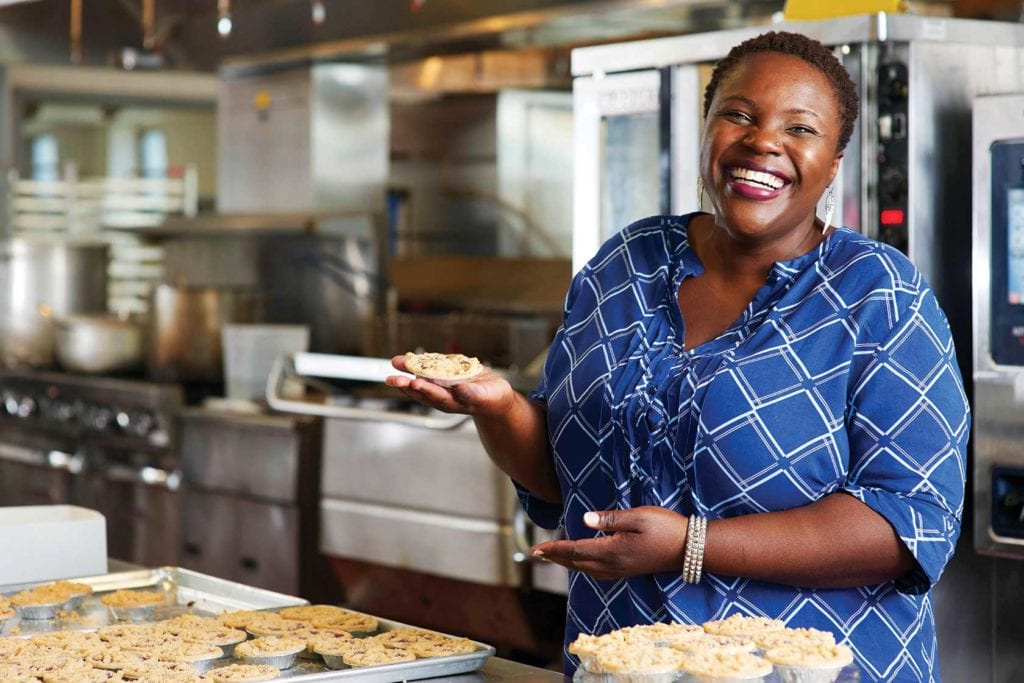Taking business wholesale
Baker scales up operations to meet order for Whole Foods

Just before Thanksgiving, local baker Teresa Maynard, founder of Sweet Teez Bakery, breathes a sigh of relief as she recalls the past four weeks spent fulfilling a major wholesale order for Whole Foods.
With a team of 13 other bakers, Maynard produced 48,000 mini pies in apple, blueberry and cherry flavors, working at a pace of 12,000 pies a week. She jokingly refers to it as “Pie-palooza.”

A display of Sweet Teez Bakery pies at Whole Foods. Photo: Hornick Rivlin Studio
“Originally we had planned to have eight weeks of production,” says the baker, who grew up in Dorchester’s Codman Square neighborhood. “But because of limited funding, we ended up producing 48,000 in four weeks. It was crazy!”
Though Sweet Teez is formally a solo operation, Maynard hired 13 temporary workers to complete the mammoth task, and then permanently took on three of them as part-time workers.
Maynard received a wholesale license for her business in September, and after being approached by Whole Foods, met with them in October.
For the two-year-old bakery business, striking a deal with Whole Foods — in which Maynard’s pies will be sold throughout the North Atlantic region’s 42 stores — was a test of scalability.
“I went into the meeting with Whole Foods to talk about 2,000 mini pies in maybe two or three stores,” says Maynard. “But then they told me they liked my pies so much that they wanted to order 48,000 of them. I’ve never done an order this big before.”
Finding help
Normally producing 1,000 baked goods a week, Maynard covered the costs of the dramatically increased production through loan financing from Boston Impact Initiative and Dorchester Bay Economic Development Corporation.
“It’s terrifying, as a business, because that first week was so crazy. All I kept thinking was, ‘This needs to work, because I took on this loan,’” she says.
With loan financing secured through a network of resources referred by Commonwealth Kitchen, the food business incubator in Dorchester out of which Sweet Teez operates, Maynard then had to find the right workers to complete the order.
“I brought the crew together really organically,” she says. Some workers were recruited from the Boston Public Health Commission and Fairmount Collaborative, while others were borrowed from other food companies who share space at Commonwealth Kitchen. And a couple of Maynard’s family members pitched in as well.
“One of my aunts came out of retirement to help me make pies,” says Maynard.
The large Commonwealth Kitchen facility was able to accommodate the scaled-up production, according to Maynard, with the kitchen’s commercial oven able to bake 1,400 pies at a time.
“We have this huge tilt skillet where you can cook a lot of things at once, that’s actually never been used before,” she says. “I was like, ‘How is this my life? I’m really processing 160 pounds of cherries every day.’”
Maynard and her team also went through 150 pounds of flour a day. “I normally buy a 25-pound bag of flour and that lasts me almost a month,” says Maynard. “I’ve used more ingredients in the past four weeks than I’ve used since I started this business.”
Luckily, Maynard says, “As you scale up, at a certain volume, you pay less for bulk.”
Budget control
In doing the numbers, Maynard says she came in under budget for some ingredients, such as fruit. She worked directly with Katsiroubas Bros., a wholesale fruit and produce supplier in Hyde Park, for the cherries, apples, and blueberries.
“We’re looking to scale the business now, now that we know what our capacity is,” says Maynard. However, she isn’t necessarily expecting to fulfill another 48,000 mini-pie order anytime soon.
“We’re expanding, but the growth is happening in a way that makes sense for us,” she says. “I don’t want to grow too quickly and not be able to sustain it. We’re trying to be strategic.”
Maynard says her business has a blended revenue stream that includes corporate clients, individual customer orders and wholesale. “There are a few cafes interested in carrying our products in the near future,” she says.
Sweet Teez has built a roster of 300 regular clients, including Capital One and Boston Consulting Group. Maynard says doing business with Capital One was one of the main reasons she started making pies in the first place. “I never used to make pies at all. I started off making cakes, cupcakes, and brownies. But Capital One calls me one day and says they want mini-pies, and I said, ‘Yeah, sure!’”
Now, Sweet Teez sells pies year-round. “Our pies are not super sweet. I want you to taste the blueberries and the cherries. I want the apples to taste like a hug,” says Maynard. “I want the pies to be vanilla-ice-cream-ready.”
Maynard’s long-term goal for the business is to have her own production and retail space. “I want to be able to do quick service in the front and have wholesale and catering going out the back,” she says.
Dessert lovers in the North Atlantic Region can now purchase Sweet Teez mini-pies at any local Whole Foods store, just in time for the holidays. “Our slogan is ‘Worth Every Bite,’” says Maynard. “Sometimes when you have dessert, it’s not worth it. But we aim to be an indulgence, an experience.”






